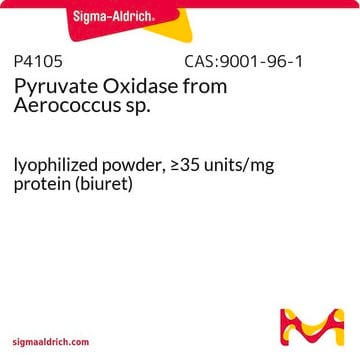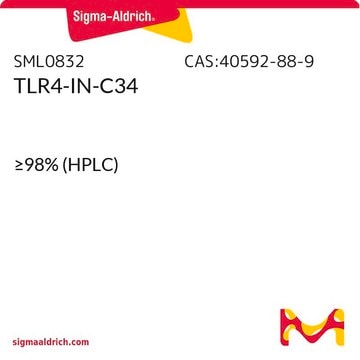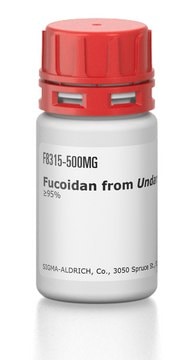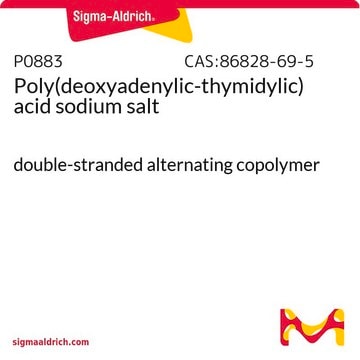P4154
Polyinosinic acid potassium salt
Homopolymer
Synonym(s):
Poly(I) potassium salt
Sign Into View Organizational & Contract Pricing
All Photos(4)
About This Item
Recommended Products
biological source
synthetic (organic)
Quality Level
Assay
≥98% (TLC)
form
lyophilized powder
solubility
water: 4.80-5.20 mg/mL, clear to hazy, colorless to faintly yellow
storage temp.
−20°C
Looking for similar products? Visit Product Comparison Guide
Application
Polyinosinic acid (Poly(I)) is a homopolymer of inosine that may be used with polycytidylic acid (poly(C)) to form the double-stranded homopolymer (Poly(I) • Poly(C)). TLR3 recognizes double-stranded RNA and is a major effector of the immune response against viral pathogens. (Poly(I) • Poly(C)) is a used as a model RNA to study cell signaling at the level of TLR3. Poly(IC) is a TRIF-dependent toll-like receptor-3 (TLR3) ligand.
Preparation Note
Prepared from IDP using polynucleotide phosphorylase.
Storage Class Code
11 - Combustible Solids
WGK
WGK 3
Flash Point(F)
Not applicable
Flash Point(C)
Not applicable
Personal Protective Equipment
dust mask type N95 (US), Eyeshields, Gloves
Certificates of Analysis (COA)
Search for Certificates of Analysis (COA) by entering the products Lot/Batch Number. Lot and Batch Numbers can be found on a product’s label following the words ‘Lot’ or ‘Batch’.
Already Own This Product?
Find documentation for the products that you have recently purchased in the Document Library.
Customers Also Viewed
Gennady Dvoryanchikov et al.
Nature communications, 8(1), 760-760 (2017-10-04)
Taste buds are innervated by neurons whose cell bodies reside in cranial sensory ganglia. Studies on the functional properties and connectivity of these neurons are hindered by the lack of markers to define their molecular identities and classes. The mouse
Xingbo Wang et al.
Veterinary microbiology, 251, 108895-108895 (2020-10-31)
RNA binding ability and cellular distribution are important for nonstructural protein 1 (NS1) of influenza A virus to act as a viral regulatory factor to control virus life cycle. In this study, we identified that the N-terminal residues 19-21 of
Overlapping and distinct roles of GRK5 in TLR2-, and TLR3-induced inflammatory response in vivo.
Packiriswamy N, Parvataneni S, Parameswaran N.
Cellular Immunology, 107-111 (2011)
Caiqi Ma et al.
International journal of oncology, 54(2), 572-584 (2018-11-30)
Gastric cancer is one of the most malignant tumor types, and its metastasis is a notable cause of mortality. Among the methods of tumor metastasis, lymphatic metastasis is the predominant one in gastric cancer. A previous study reported that the
Activation of chemokine and inflammatory cytokine response in HCV-infected hepatocytes depends on TLR3 sensing of HCV dsRNA intermediates.
Li K, Li NL, Wei D, Pfeffer SR, et al.
Hepatology, 55(3), 666-675 (2011)
Our team of scientists has experience in all areas of research including Life Science, Material Science, Chemical Synthesis, Chromatography, Analytical and many others.
Contact Technical Service








![Poly[d(I-C)] lyophilized, pkg of 10 U (10108812001 [A<sub>260</sub> units]), pkg of 50 U (11219847001 [A<sub>260</sub> units])](/deepweb/assets/sigmaaldrich/product/images/352/091/ef743cea-ccd8-44f1-8f3b-dec5a1e4f5d1/640/ef743cea-ccd8-44f1-8f3b-dec5a1e4f5d1.jpg)




